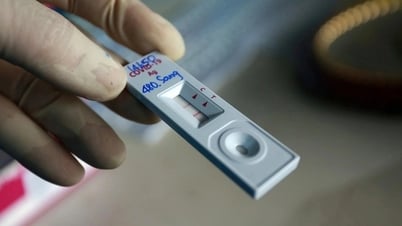 |
| Vitamin D is important for health. (Source: Shutterstock) |
Vitamin D, also known as the sunshine vitamin, is important for bone health, immunity, mood, and hormonal balance. When getting enough sunlight is not an option, many people turn to supplements to get the vitamin D they need.
| Related News |
 Supplement Omega-3 fatty acids with plant-based products Supplement Omega-3 fatty acids with plant-based products |
However, despite rigorous supplementation every morning, many people still end up being deficient in vitamin D. Here are 7 tips to keep in mind to make vitamin D supplementation more effective.
Don't Skip Healthy Fats When Taking Medication
Taking vitamin D on an empty stomach or with a low-fat meal can significantly reduce absorption. In fact, one study found that people who took vitamin D with a high-fat meal absorbed 32% more than those who took it without fat.
So, pair your supplement with healthy fats like avocado, nuts, or a spoonful of peanut butter.
Time to drink
Taking vitamin D in the morning helps to better metabolize vitamin D. This is because morning sunlight helps activate enzymes in the liver and kidneys to convert the supplement into its active form.
Combining the supplement with sunlight for even just 10 minutes can act as a catalyst, giving the supplement a natural boosting effect.
So, try sitting near a sunny window or taking a short walk right after taking your medication.
Magnesium supplement
Magnesium is needed to activate Vitamin D in the body. One study found that people who were deficient in magnesium did not benefit fully from Vitamin D, even if their dosage was perfect. Without magnesium, Vitamin D would not work.
A simple fix is to add magnesium-rich foods like bananas, almonds, and spinach to your daily diet or consider taking a separate supplement if needed.
Be careful with caffeine and fiber right after drinking
Caffeine can increase calcium excretion, which works closely with vitamin D. Similarly, large amounts of fiber (especially bran or psyllium husk) can bind to fat-soluble vitamins and reduce their absorption. It is best to take vitamin D supplements 1-2 hours before or after coffee or a high-fiber meal.
Check levels every few months
Genetics, gut health, and even age affect how much Vitamin D you need. Some people, however, may not be able to convert supplements into their active form effectively.
In others, intestinal absorption is impaired. Therefore, testing every 4-6 months ensures that the dose is actually working.
This helps to adjust the dosage, rather than assuming that one dose fits all.
Pay attention to intestinal health
A healthy gut lining is essential for absorbing Vitamin D. Conditions like irritable bowel syndrome (IBS), celiac disease, or even chronic bloating can interfere with nutrient absorption.
Vitamin D is fat-soluble and depends on proper bile flow and enzyme activity from the gut. A sluggish or inflamed gut can silently hinder the effectiveness of this supplement.
Focusing on fermented foods, probiotics, and fiber variety can promote gut health and thus increase the effectiveness of Vitamin D.
Higher dose is not always better
The body does not always absorb large doses and may even waste excess. Research shows that small daily doses (1,000-2,000 IU) are absorbed more consistently than large weekly or monthly doses, unless prescribed to treat a deficiency.
Overdose can cause calcium buildup and other side effects.
Low and regular doses are key to getting your body to actually use the vitamin properly.
Source: https://baoquocte.vn/bay-cach-bo-sung-vitamin-d-hieu-qua-314245.html


![[Photo] T&T 1 and Ho Chi Minh City 1 People's Police Teams won the men's and women's team championships](https://vphoto.vietnam.vn/thumb/1200x675/vietnam/resource/IMAGE/2025/5/22/39db06ae67cb4001b7a556e8d9a56d07)


![[Photo] General Secretary To Lam chairs a working session with the Central Internal Affairs Commission](https://vphoto.vietnam.vn/thumb/1200x675/vietnam/resource/IMAGE/2025/5/22/3b7790f499da45b2803d8ae253207ef1)
![[Photo] Press delegation meeting to visit Truong Sa and DK1 Platform](https://vphoto.vietnam.vn/thumb/1200x675/vietnam/resource/IMAGE/2025/5/22/6b8d232877ec421a9e8187d83b9f8006)
![[Photo] Prime Minister Pham Minh Chinh chairs meeting on draft Resolution of National Assembly on International Financial Center in Vietnam](https://vphoto.vietnam.vn/thumb/1200x675/vietnam/resource/IMAGE/2025/5/22/d398664ff1a140629169ea5a24e1b4d0)
















































![[Infographic] Investment project to build Tu Lien bridge and roads at both ends of the bridge](https://vphoto.vietnam.vn/thumb/402x226/vietnam/resource/IMAGE/2025/5/23/3c167ece69cb4aecb3e55de5ebc38b88)

























![[Podcast] Week introducing more than 500 OCOP products in Hanoi](https://vphoto.vietnam.vn/thumb/402x226/vietnam/resource/IMAGE/2025/5/22/d144aac2416744718388dbae3260e7fd)





Comment (0)